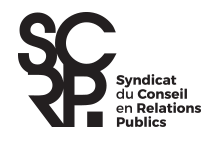Working with an agency

Why contact an agency?
Companies can decide to manage public relations in-house, with communication managed directly by the Communication manager in a dedicated Communication department, or to outsource its PR to a public relations consultancy.
There are a number of different reasons for contacting a PR consulting agency:
- To have the benefit of an external and objective point of view: the agency offers a fresh eye on the company’s communication strategy, or confirms the appropriateness of the approach taken by the Communication department.
- The need to renew the creative dimension of their communication.
- The need for the opinion of experts whose competence is based on diverse expertise and experience.
➔ communication RSE
➔ affaires publiques & lobbying
➔ communication du dirigeant
➔ communication financière
➔ communication digitale / e-réputation
➔ communication de crise
➔ communication des marques
➔ relations médias
➔ communication événementielle
➔ communication interne
➔ accompagnement du changement
➔ média-training
➔ production de contenu rédactionnel / audiovisuel
- From local to international: the company can choose an agency that is firmly established in its region to benefit from its knowledge of the local target audience, or to call on the services of a firm affiliated with an international group or that is a member of an international network to conduct a multinational campaign or provide an understanding of international issues.
- Save time and money: if it doesn’t have integrated PR structures – that require both strategic and operational resources – or if it needs to reinforce the existing structures, a PR consulting agency can be used occasionally to alleviate the workload or deal with a specific problem in an area where the company does not have the requisite experience. The flexibility offered by an agency can be used either regularly or as needed.
- The PR consulting agency is an ally when companies are establishing their internal communication structure, assisting in recruitment, training and preparing programmes.
The explosion in new media, in the variety of intelligence and monitoring technologies and the transformation of communication techniques are additional reasons to outsource communication needs.
Consult the “Guide Pratique des Relations Publics” (Practical PR Guide)
Areas of Public Relations
Corporate communication
… or how to present the company to the public in the best light. A “corporate” approach will focus on the economic performance of the company and on its values, which are expressed in its HR management, its environment policy and contribution to general interest causes. There are as many tools available as there are techniques, from print media, audiovisual production, websites, events and sponsorship to advertising.
Corporate Social Responsibility (CSR) communication
The interface between the company and society is decisive in building reputation. The role of companies within society and their actions in the common good are seen as crucial for public opinion. The more a company does to better its direct and indirect environment, the better its image.
Public Affairs and lobbying
Companies and organisations increasingly organise to defend and promote their interests with government bodies and political decision-makers, on both a national (governement, central administrations) and regional level (local authorities, decentralised government services).
Director’s communication
What directors say, regardless of their media profile, can create or destroy value. Their message is even more critical in crisis situations, when what they say is interpreted as positive or negative signals and actions are judged as acceptable or not by stakeholders.
With the increasingly powerful role of social media, what directors say has become a major reputation issue, both for the directors themselves and for the organisation as a whole.
Financial communication
Financial communication is part of overall corporate communication. Its aim is to inform the financial community and those interested in the company’s performance, including financial analysts, institutional investors, shareholders and bankers, as well as the financial and economic press.
Digital communication/E-reputation
The development of social media has had a major impact on public relations strategies and tools. Moreover, social media have greatly increased the opportunities for dialogue between companies and the public, making public relations crucial to building trust. Digital communication should include the new web uses as part of a company’s communication strategy.
Crisis communication
Crisis communication consists of anticipating and preparing for the risks a company might have to face. When a crisis happens, communication addresses the group involved: victims, public authorities, the media, company pesonnel and public opinion in general. It entails designing and implementing preventive and crisis management policies to deal with crises that might affect a company, its products and services, and its employees.
Brand communication
Bringing forward brands and products or services is crucial to a company’s success. Public relations plays a key role to support sales in building the brand’s notoriety, inspiring, creating positive word of mouth or providing reassurance around brand quality.
Media relations
Previously known as “press relations”, media relations aim to interact with a specific target group of journalists, prescribers and influencers (Internet), who are both stakeholders and opinion influencers.
Event communication
Event communication is an internal or external non-media communication tool used by a company or organisation to create an event that will build an image with the target audience.
Internal communication
Internal communication has several objectives: inform and encourage employees to uphold the company’s values and organisational policy, exert influence, and contribute to motivating and building engagement.
Change management
Periods of transformation are a reality for all organisations. Change can be major (restructuring, merger or change of strategy) or minor (change of process or change your information system). But, in all cases, the organisation’s men and women are key to the success of these transformations. Change management aims at facilitating understanding and buy-in by internal and external stakeholders, and at preventing crises.
Media training
Speaking in front of a group of journalists, or one-to-one, is no easy task – especially when you find yourself in front of a radio microphone or a television camera. Even the most charismatic people must master the techniques of public speaking through media training sessions. Topics include how to pinpoint your core message, ensure it is heard and remembered; how to answer awkward questions; how to use eye movement, voice, and body language in general.
Production of editorial/ audiovisual content
The production of content is a multidisciplinary activity in public relations agencies and forms the basis for building communication strategy. Several types and formats of content are created for the product and the brand: white books, ad hoc studies, story-telling, computer graphics, videos etc.
Announce your tenders to ours clients
Do you wish to submit a tender or to be listed with our PR consulting agencies?
Whether or not you want to remain anonymous, the permanent team at Syntec Conseil en Relations Publics can act as your intermediary with its members.
Contact us
anne-mareille.dubois@groupement-syntec.org.
01 44 30 49 91.







